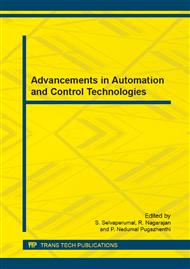[1]
Ian T. Foster, Carl Kesselman and Steven Tuecke, The anatomy of the grid enabling scalableVirtualOrganisations, CoRR, cs. AR/0103025, (2001).
Google Scholar
[2]
M. Baker,R. Buyya and D. Laforenza, Grids andGrid Technologies for wide area Distributed Computing, in Journal of software-Practice& Experience , vol. 32, no. 15, p.14371466, (2002).
DOI: 10.1002/spe.488
Google Scholar
[3]
I. Foster, The Grid: A new infrastructure for 21st century science, Physics Today, vol. 55, no. 2, p.42–47, (2002).
DOI: 10.1063/1.1461327
Google Scholar
[4]
Algirdas Avizienis, Jean-Claude Laprie, Brian Randell and Carl Landwehr, Basic Concepts and Taxonomy of Dependable and Secure Computing, IEEE Trans, Dependable and Secure Computing, vol. 1, no. 1, Jan-Mar (2004).
DOI: 10.1109/tdsc.2004.2
Google Scholar
[5]
M. Strasser and K. Rothermel. System Mechanism for Partial Rollback of Mobile Agent Execution", Proc. 20th Int, l Conf. on Distributed Computing Syst., pp.20-28, (2000).
DOI: 10.1109/icdcs.2000.840903
Google Scholar
[6]
S. Pleisch and A. Schiper. FATOMAS - A Fault-Tolerant Mobile Agent System Based on teh Agent-Dependent Approach", Proc. Int, l Conf. on Dependable Syst. and Networks, pp.215-224, (2001).
DOI: 10.1109/dsn.2001.941407
Google Scholar
[7]
S. Pleisch and A. Schiper. Modeling fault-tolerant mobile agent execution as a sequence of agreement problems", Proc. of 19th IEEE Symposium on Reliable Distributed Systems (SRDS, 00), Nuremberg, Germany, pp.11-20, (2000).
DOI: 10.1109/reldi.2000.885388
Google Scholar
[8]
E. Gendelman, L.F. Bic, and M.B. Dillencourt. An Application- Transparent, Platform-Independent Approach to Rollback-recovery for Mobile Agent Systems", Proc. 20th Int, l Conf. on Distributed Computing Syst., (2000).
DOI: 10.1109/icdcs.2000.840971
Google Scholar
[9]
Y. Ling, J. Mi, and X. Lin. A variational calculus approach to optimal checkpoint placement, IEEE Transactions on Computers, Vol. 59, No. 7, pp.699-708, (2001).
DOI: 10.1109/12.936236
Google Scholar
[10]
Stanley Araujo de Sousa, Francisco Jos´e da Silva e Silva, A Flexible Fault-Tolerance Mechanism for the Integrade Grid Middleware.
DOI: 10.1109/icns.2007.7
Google Scholar
[11]
Javier carretero, fatos xhafa, ajithabraham, "Genetic Algorithm Based Schudulers for Grid Computing System.
Google Scholar
[12]
Soon Hwang and Carl Kesselman A Flexible Framework for Fault Tolerance in the Grid, Journal of Grid Computing 1: 251–272, (2003).
DOI: 10.1023/b:grid.0000035187.54694.75
Google Scholar
[13]
Pankaj Jalote, Fault Tolerance in DistributedSystems, ISBN: 0-13-301367-7, (1994).
Google Scholar


